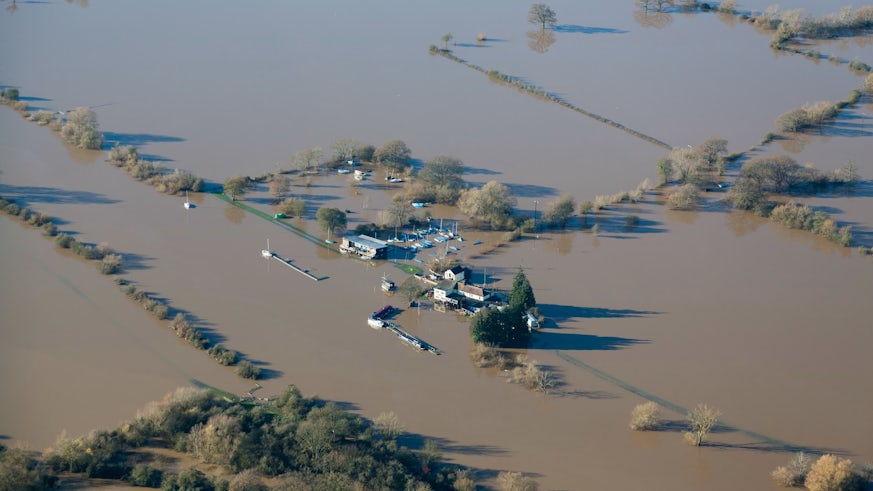Climate adaptation
31 August 2016

UK local approaches to climate adaptation are more reactive than proactive, severely affecting local capacity to plan for future climate impacts, according to research led by Cardiff University presented at the Royal Geographical Society Annual International Conference.
The study, undertaken by Dr Andrew Kythreotis, Professor Paul Milbourne and Professor Terry Marsden of the University’s School of Geography and Planning along with Dr Theresa Mercer of Cranfield University, examined how transformative adaptation to climate change – as framed at the international level by the IPCC – is being approached by local policy makers in the UK.
Transformative adaptation recognises that fundamental changes within and across systems are needed to properly respond to the future impacts of climate change.
The study, which was funded by the Regional Studies Association, found that the way transformative adaptation is framed for policy makers by the IPCC does not reflect the practical realities of local adaptation discourse in the UK. UK local adaptation discourses were found to be characterised by a subsuming of adaptation planning into a ‘resilience’ framework that prioritised growth.
Dr Kythreotis, the study’s Principal Investigator said: “By focusing on resilience, local authorities in the UK have been able to capture a wider network of stakeholders at the local level, including local businesses. However, the upshot of this is that local adaptation responses have tended to be framed within more immediate local priorities like economic growth and development and short-term responses to climate impacts. This has resulted in local climate adaptation responses being reactive rather than proactive, severely reducing local capacity to plan for future long-term climate impacts.
“In UK national policy frameworks adaptation needs to be framed within a different model to ‘growth’ to avoid transformative adaptation being solely viewed locally as an opportunity for economic development.”
The study’s findings were based on interviews with policy and governance stakeholders working on climate adaptation issues across a number of UK cities in devolved regions (Glasgow, Hull, Cardiff, Edinburgh, York, Leeds and London) during the summer of 2014.
Further headline recommendations from the research include:
- National statutory frameworks (e.g. The Climate Change Act 2008 and the Localism Act 2011) need to go even further in providing a stronger local regulatory framework for local climate adaptation in the long-term. Currently, in terms of adaptation long-term planning, they only provide the opportunity for local authorities to make changes rather than statutorily obliging them to.
- To ensure a transformative approach to climate adaptation as framed by the IPCC, responsibility for climate change at the national government level should come from a single department, not one department looking after mitigation and energy and another looking after adaptation. Adaptation and mitigation are not mutually exclusive.
- Local approaches to climate change adaptation should not just involve throwing money into large scale infrastructure problems (i.e. large scale hard engineered flood defences) as a reactive adaptation response. Expenditure needs to be more closely aligned to local socio-political and environmental contexts, so that when climate-related impacts like floods do occur, communities are better prepared to limit potential damage.
- The way in which climate change science is translated into policy needs to ensure wider appreciation of different academic disciplines and not just promote physical and technical fixed responses (e.g. The Kyoto Protocol relies on specific technical knowledge to arbitrarily limit global temperatures) that can delimit transformative change.
Dr Kythreotis added: “UK legislation, like the Climate Change Act 2008 and the Localism Act 2011, has come a long way in giving local authorities greater freedoms to promote increased action on climate adaptation. However, the results of this research demonstrate that more needs to be done by central government to ensure that adaptation is not side-lined in favour of lowering carbon emissions and greater energy security – adaptation is now an important local policy reality in its own right, as the last decade has shown.
“Legislation also needs to ensure that local authorities can statutorily plan for longer term climate impacts and not just react to impacts as they happen. For local transformative adaptation to become a practical reality, there is a requirement for scientists, government, policy makers and local communities to work more closely with one another in developing locally specific adaptation frameworks. Such frameworks need to take into account local social, political and environmental knowledge contexts, in addition to globally-framed established scientific evidence on climate change, in terms of future climate planning in our communities.”